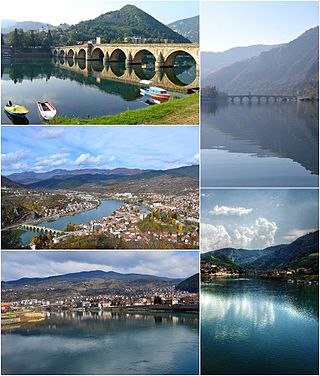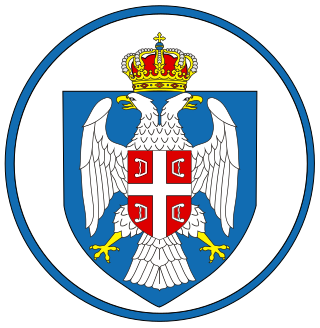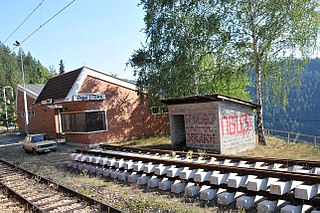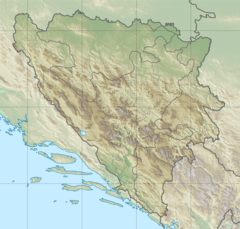
Vilina Vlas was a rape camp active during the Bosnian War. It served as one of the main detention facilities where Bosniak civilian prisoners were beaten, tortured and murdered and women were raped by prison guards during the Višegrad massacres in the Bosnian War of the 1990s. It is located about four kilometers north-east of Višegrad, in the village of Višegradska Banja.

Višegrad is a town and municipality in Republika Srpska, Bosnia and Herzegovina. It rests at the confluence of the Drina and the Rzav river. As of 2013, the municipality has a population of 10,668 inhabitants, while the town of Višegrad has a population of 5,869 inhabitants.
Mitar Vasiljević was a Bosnian Serb who was convicted of crimes against humanity and violation of the laws or customs of war by the International Criminal Tribunal for the Former Yugoslavia (ICTY) for his actions in the Višegrad region during the Bosnian War. He was a member of Milan Lukić's White Eagles paramilitary group.

Milan Lukić is a Bosnian Serb war criminal who led the White Eagles paramilitary group during the Bosnian War. He was found guilty by the International Criminal Tribunal for the Former Yugoslavia (ICTY) in July 2009 of crimes against humanity and violations of war customs committed in the Višegrad municipality of Bosnia and Herzegovina during the Bosnian war and sentenced to life in prison.

The Višegrad massacres were acts of mass murder committed against the Bosniak civilian population of the town and municipality of Višegrad during the ethnic cleansing of eastern Bosnia by Republika Srpska police and military forces during the spring and summer of 1992, at the start of the Bosnian War.
Uzamnica camp was an internment camp established in 1992 by the Yugoslav People's Army (JNA) forces housing Bosniak civilian prisoners during the Bosnian War.

The White Eagles, also known as the Avengers, were a Serbian paramilitary group associated with the Serbian National Renewal (SNO) and the Serbian Radical Party (SRS). The White Eagles fought in Croatia and Bosnia and Herzegovina during the Yugoslav Wars.

There was a campaign of ethnic cleansing in the area of the town of Foča committed by Serb military, police, and paramilitary forces on Bosniak civilians from 7 April 1992 to January 1994 during the Bosnian War. By one estimate, around 21,000 non-Serbs left Foča after July 1992.
Momir Savić is a Bosnian Serb paramilitary commander convicted for war crimes committed during the ethnic cleansing of the Višegrad region of eastern Bosnia during the 1992-1995 Bosnian War.
The Sjeverin massacre was the massacre on 22 October 1992 of 16 Bosniak citizens of Serbia from the village of Sjeverin who had been abducted from a bus in the village of Mioče, in Bosnia. The abductees were taken to the Vilina Vlas hotel in Višegrad where they were tortured before being taken to the Drina River and executed. Members of a Serbian paramilitary unit commanded by Milan Lukić were convicted of the crime in 2002.
The Bosanska Jagodina Massacre refers to the execution of 17 Bosniak civilians from Višegrad on 26 May 1992, all of which were men. This war crime was most probably carried out by paramilitary forces "Avengers" led by Milan Lukić, under the control of the Army of Republika Srpska. In 2006 the remains of the murdered men were found in a mass grave in Crnčići near Bosanska Jagodina. According to the Commission for missing persons in Bosnia and Herzegovina the following were executed that day : Bajro Murtić, Ismail Račić, Hidajet Račić, Mirsad Veletovac, Kemal Maluhić, Sead Šuško, Midhat Kasapović, Abdulah Veletovac, Ahmet Kadrić, Esad Tabaković, Bajro Beširević, Mehmed Džagadurov, Hamed Zukić, and one person with the surname Kasapović from the village Žagre near Višegrad.
The Pionirska Street fire was an arson fire perpetrated by Bosnian Serb forces in Višegrad, eastern Bosnia, on 14 June 1992 in which 59 Bosniak women, children and elderly people were murdered by being locked into one room of a house, which was then set on fire.
The Bikavac fire refers to the arson perpetrated in Bikavac, near Višegrad, eastern Bosnia, on 27 June 1992 in which at least 60 Bosniak civilians, mostly women and children, were burned alive after the Serb forces captured them in the house which was set on fire.
Željko Lelek, a Bosnian Serb war criminal who was the first individual indicted for the mass rape crimes that were a feature of the expulsion of the Bosniak population of the town of Višegrad, as part of the strategic campaign of ethnic cleansing carried out in the Drina Valley in the early days of the Bosnian War.

The Štrpci massacre was the massacre of 19 civilians on 27 February 1993, taken from a Belgrade-Bar train at Štrpci railway station near Višegrad, on Bosnian territory.
Branimir Savović is the former president of the Serbian Democratic Party (SDS) for the municipality of Višegrad in eastern Bosnia and Herzegovina at the time of the outbreak of the Bosnian War 1992-1995. He was appointed to the Presidency of the Municipality by the Bosnian Serb authorities and became President of the "Crisis Staff Committee" established to assume responsibility for the civilian administration of the town. It was during his presidency of the Crisis Staff that the Višegrad massacres took place and the campaign of terror conducted by Milan Lukić and his White Eagles gang proceeded unchecked until Višegrad was purged of its entire Bosniak population. Višegrad has been described as second only to Srebrenica as a byword for ethnic cleansing and for humanity at its cruellest.

The siege of Goražde refers to engagements during the Bosnian War (1992–95) in and around the town of Goražde in eastern Bosnia.
Radomir Radovan Šušnjar known as "Lalco", is a convicted Bosnian Serb war criminal who took part in the Pionirska Street fire on 14 June 1992 which killed 59 people.

The town of Višegrad in eastern Bosnia and Herzegovina was seized by Bosnian Serb forces in April 1992 during the first days of the Bosnian War. Bosnian Serb members of the local Territorial Defence (TO), supported by local Bosnian Serb police and some members of the Yugoslav People's Army (JNA), quickly overcame heavily overmatched local Bosnian Muslim police and reserve police elements supported by some armed members of the Patriotic League. Following the seizure of the town, Bosnian Serb paramilitaries committed numerous war crimes against the remaining Bosnian Muslim population of the town and surrounding area. Several Bosnian Serbs politicians and paramilitary group members were later convicted for committing war crimes and/or crimes against humanity against the Bosnian Muslim population of Višegrad by the International Criminal Tribunal for the former Yugoslavia.








